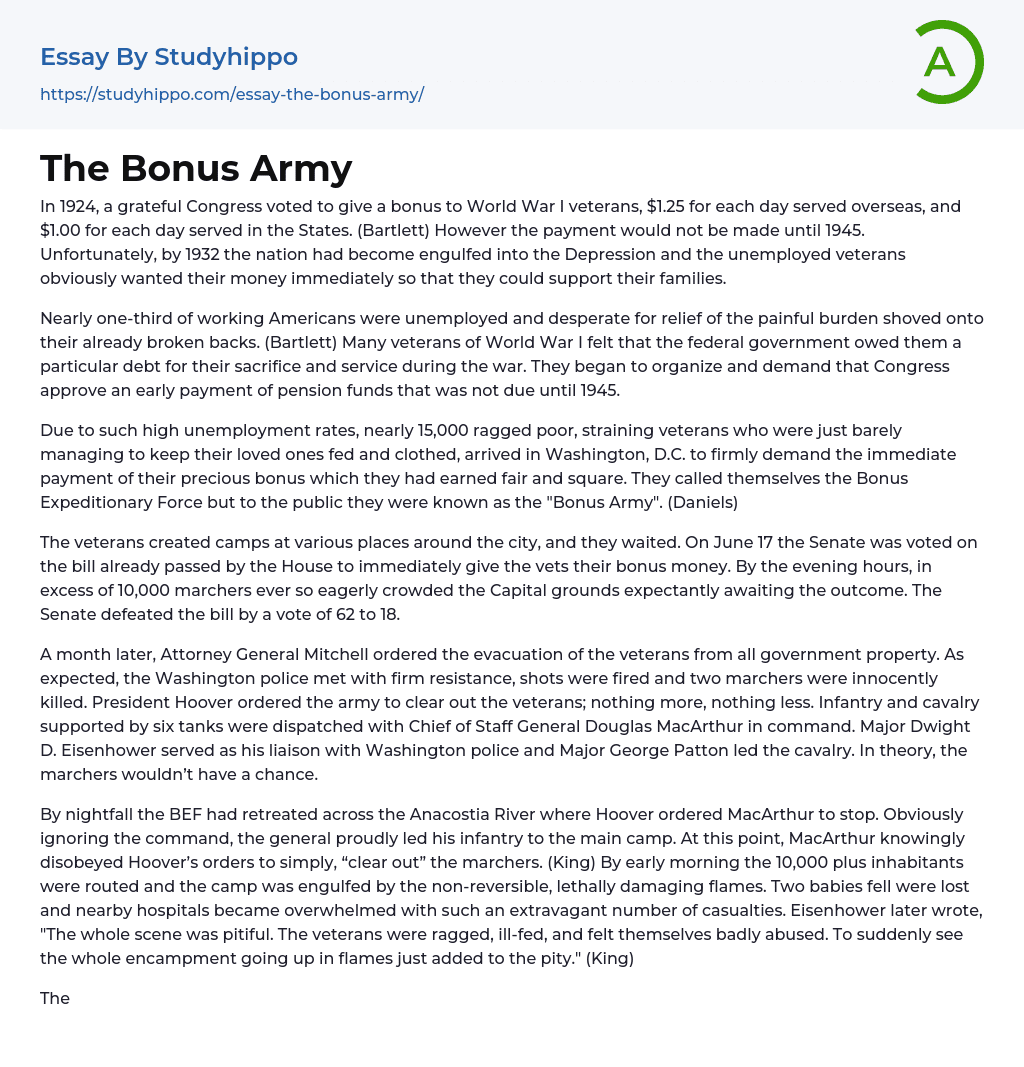In 1924, a grateful Congress voted to give a bonus to World War I veterans, $1.25 for each day served overseas, and $1.00 for each day served in the States. (Bartlett) However the payment would not be made until 1945. Unfortunately, by 1932 the nation had become engulfed into the Depression and the unemployed veterans obviously wanted their money immediately so that they could support their families.
Nearly one-third of working Americans were unemployed and desperate for relief of the painful burden shoved onto their already broken backs. (Bartlett) Many veterans of World War I felt that the federal government owed them a particular debt for their sacrifice and service during the war. They began to organize and demand that Congress approve an early payment of pension funds that was not due until 1945.
tyle="text-align: justify;">Due to such high unemployment rates, nearly 15,000 ragged poor, straining veterans who were just barely managing to keep their loved ones fed and clothed, arrived in Washington, D.C. to firmly demand the immediate payment of their precious bonus which they had earned fair and square. They called themselves the Bonus Expeditionary Force but to the public they were known as the "Bonus Army". (Daniels)
The veterans created camps at various places around the city, and they waited. On June 17 the Senate was voted on the bill already passed by the House to immediately give the vets their bonus money. By the evening hours, in excess of 10,000 marchers ever so eagerly crowded the Capital grounds expectantly awaiting the outcome. The Senate defeated the bill by a vote of 62 to 18.
A mont
later, Attorney General Mitchell ordered the evacuation of the veterans from all government property. As expected, the Washington police met with firm resistance, shots were fired and two marchers were innocently killed. President Hoover ordered the army to clear out the veterans; nothing more, nothing less. Infantry and cavalry supported by six tanks were dispatched with Chief of Staff General Douglas MacArthur in command. Major Dwight D. Eisenhower served as his liaison with Washington police and Major George Patton led the cavalry. In theory, the marchers wouldn’t have a chance.
By nightfall the BEF had retreated across the Anacostia River where Hoover ordered MacArthur to stop. Obviously ignoring the command, the general proudly led his infantry to the main camp. At this point, MacArthur knowingly disobeyed Hoover’s orders to simply, “clear out” the marchers. (King) By early morning the 10,000 plus inhabitants were routed and the camp was engulfed by the non-reversible, lethally damaging flames. Two babies fell were lost and nearby hospitals became overwhelmed with such an extravagant number of casualties. Eisenhower later wrote, "The whole scene was pitiful. The veterans were ragged, ill-fed, and felt themselves badly abused. To suddenly see the whole encampment going up in flames just added to the pity." (King)
The public reaction was mixed. Many were sympathetic to the veterans, but also felt that order had to be maintained. The sight of men massed around the Capital to influence legislation did not bode well with the majority Americans. However, many thought that the Government acted with undue force. (Pbs) The press was decided critical and newspaper and newsreel images of flames in the nation's capital and
bloodied veterans were featured like movie stars in People Magazine. President Hoover didn’t order an attack on the major encampment at Anacostia. (King)
The resulting attack, however, was just another product in lowering the general public’s view of President Hoover. Hoover did not censure MacArthur for exceeding his orders. In 1936, Wright Patman reintroduced the cash-now bonus act, which then became law. (Daniels) Senator Harry S. Truman of Missouri, a combat veteran of World War I himself, defied his president in supporting the bonus. In June 1936, the first veterans began cashing checks that averaged about $580 per man. (Pbs) Ultimately, nearly $2 billion was distributed to 3 million World War I veterans. Mission complete, problem solved.
- Sergeant essays
- World War I essays
- World War Ii essays
- Atomic Bomb essays
- American Civil War essays
- Attack essays
- Cold War essays
- Crimean War essays
- Emilio Aguinaldo essays
- Iraq War essays
- Korean War essays
- Nazism essays
- Nuclear Weapon essays
- Philippine Revolution essays
- Trench Warfare essays
- Vietnam War essays
- Western Front essays
- Diplomacy essays
- Emperor essays
- Rwanda essays
- Tribe essays
- Revolutionary War essays
- War of 1812 essays
- Mexican American War essays
- Hitler essays
- The Spanish American War essays
- League Of Nations essays
- Battle Of The Somme essays
- Treaty Of Versailles essays
- Fascism essays
- D-day essays
- Atomic Physics essays
- Atomic Bombings Of Hiroshima And Nagasaki essays
- Electron essays
- Air Force essays
- Army essays
- Army Values essays
- Soldiers essays
- United States Army essays
- Veteran essays
- Absolutism essays
- Appeal essays
- Bourgeoisie essays
- Contras essays
- Corporate Governance essays
- Corruption essays
- Democracy essays
- Democratic Party essays
- Developed Country essays
- Dictatorship essays




